|
|
|
|
|
|
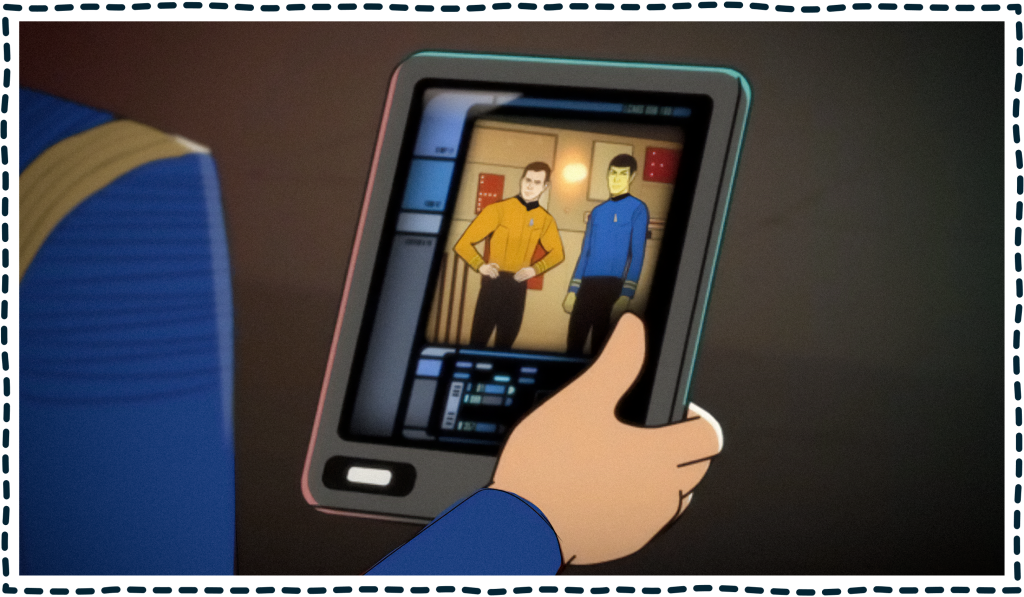
|
|
|
When E.M. Forster imagined people connected through video screens in 1909's The Machine Stops, he unknowingly predicted remote learning more than a century before Zoom. Douglas Adams' Hitchhiker's Guide to the Galaxy envisioned a portable encyclopedia decades before Wikipedia, while Star Trek crew members used handheld 'PADDs' long before iPads became educational staples. Science fiction has always been our first draft of the future—especially in education.
|
Drawing from Asimov's I, Robot, Tony examines how AI shifts us toward "functioning knowledge" as machines increasingly handle "declarative knowledge." He identifies four key attributes for our AI-augmented future: agility, innovation, holistic problem-solving, and principled action. As Tony argues:
|
|
|
|
"The ability to use ethical reasoning in order to take principled action... becomes the most important thing we, as a species, need to learn."
|
|
|
In a world where AI systems are trained on the sum total of human knowledge—including our biases and prejudices—our capacity for ethical decision-making becomes not just a professional advantage but potentially the safeguard of our collective future.
|
|
|
|
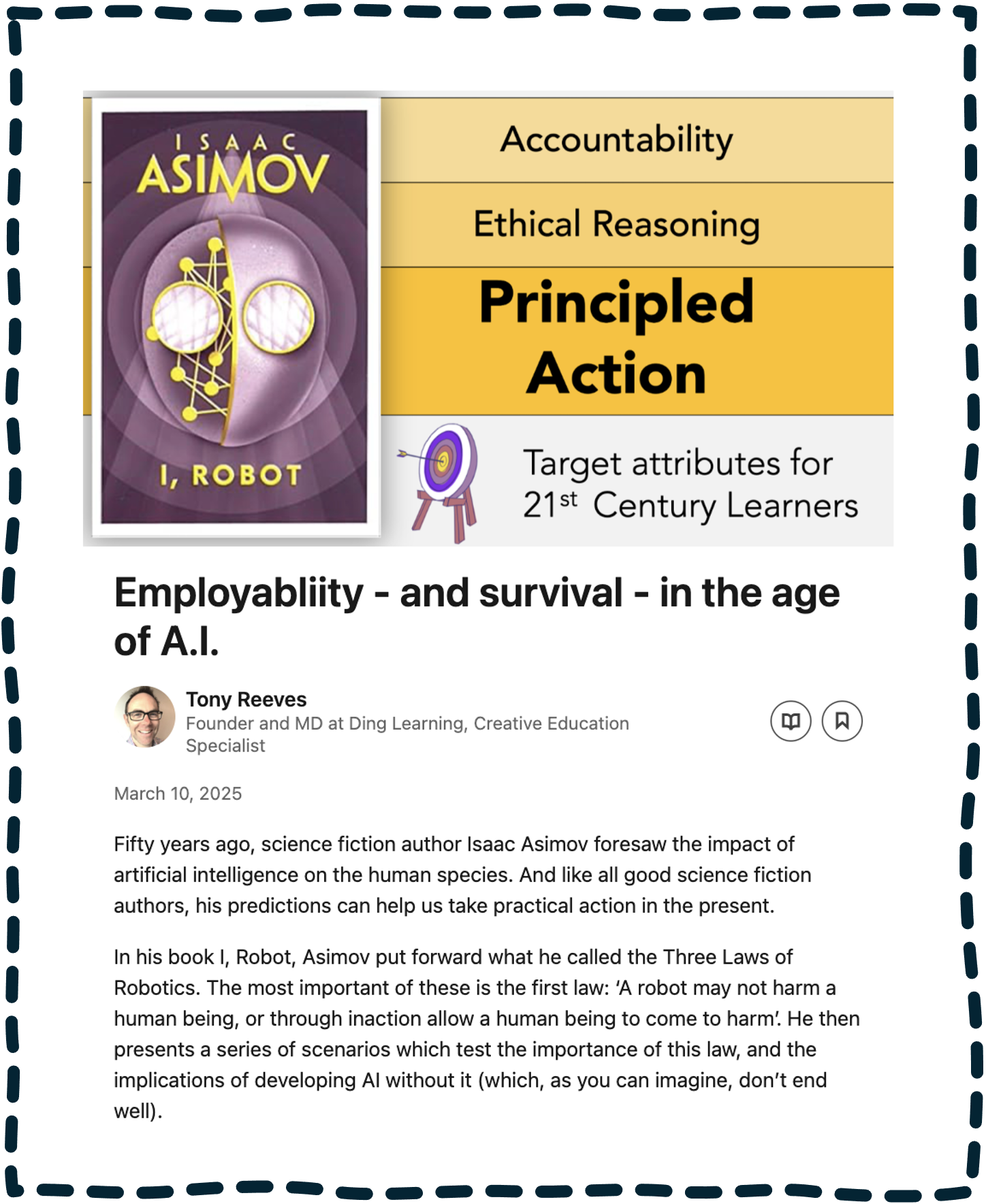
|
|
|
|
|
|
Further inspired by science fiction's power to illuminate possible futures, Tony and Ding's Director of Learning Experiences Phil Gomm 'travelled into the future' to explore the logical conclusion of Tony's insights.
|
If AI increasingly handles the recall and application of information—making the internalisation of declarative knowledge optional rather than essential—what happens to our entire system of educational measurement? When machines become the repositories of human knowledge, the very concept of assessing what students "know" becomes fundamentally transformed. What happens when AI renders traditional assessment—the means by which educational institutions certify the knowledge of learners—obsolete?
|
Tony and Phil's exploration revealed several transformative shifts already beginning to reshape education:
|
- From Knowledge to Collaboration: Future organisations increasingly value professionals who work effectively with AI rather than compete against it—combining human insight with machine processing
- From Credentials to Portfolios: As universal access to knowledge democratises expertise, demonstrated capabilities become more valuable than standardised credentials—showing over telling
- From Standardisation to Personalisation: Human value flourishes in qualities AI can't easily replicate—creativity, ethical reasoning, interpersonal wisdom—requiring new kinds of assessment
- From Gatekeeping to Facilitating: Educational institutions evolve from credentialing gatekeepers to facilitators of meaningful experiences that develop uniquely human capabilities
In this future view, Tony and Phil saw both promise and challenge. Universal access to declarative knowledge creates benefits similar to Universal Basic Income—a cognitive freedom that allows deeper engagement with ideas. When freed from assessment systems that reward reproducing information in exchange for grades—whether through exams, standardised essays, or formulaic projects—students engage with knowledge more authentically, exploring intellectual territories with genuine curiosity rather than focusing on performative displays of learning.
|
|
Yet as traditional assessment systems recede, new hidden structures emerge. Social capital, cultural knowledge, and network connections—resources that correlate strongly with existing privilege—become even more crucial determinants of opportunity, potentially creating new inequities unless thoughtfully addressed.
|
|
|
|
|
|
|

|
|
|
|
|
Having examined the impact of AI on assessment, Phil and Tony recognised that this future isn't a distant possibility—it's already here. As assessment evolves in response to AI's capabilities, ideas around what we mean by 'teaching excellence' and 'employability' need fresher perspectives.
|
In their recent webinar, The Art of Teaching Excellence, Phil and Tony shared their practical approaches to these changing realities. While current frameworks like the TEF often reduce teaching excellence to metrics and narrow employability to job-readiness checklists, the emerging AI landscape invites us to reconsider both concepts.
|
The webinar presented teaching excellence as rooted not in delivering content but in developing functioning knowledge—the capacity to apply understanding in unpredictable contexts. This refreshed vision means "facilitating learning experiences that transform knowledge into capability through intentional design—developing graduates who can navigate and shape uncertain futures."
|
You can watch the full webinar here, but below are the essential takeaways from Tony and Phil's conversation on the meaning of 'teaching excellence' in an AI-augmented world:
|
- Redefining Teaching Excellence: Teaching excellence should be understood as facilitating learning experiences that transform knowledge into capability through intentional design—not just delivering content or satisfying regulatory metrics.
- Redefining Employability: Employability isn't simply about job-ready skills, but rather the capacity to apply and adapt knowledge effectively in variable contexts—possessing fundamental attributes that enable individuals to respond to uncertainty.
- Focus on Functioning Knowledge: The key is developing "functioning knowledge" (the ability to apply knowledge in practical situations) rather than just "declarative knowledge" (factual information that can be stated).
- Teaching Less to Learn More: Excellent teaching requires stepping back from content delivery to create space for students to apply knowledge in uncertain scenarios. This activates functioning knowledge.
- Subject Content as MacGuffin: Teaching excellence requires recognising that subject content often serves as a 'MacGuffin'—a plot device that drives learning but isn't the real purpose. The hidden curriculum (unspoken expectations, cultural norms, and ways of thinking) matters as much—if not more.
- Creating Learning Communities: Breaking down boundaries between disciplines and establishing spaces where different perspectives interact helps develop cross-disciplinary thinking essential to functioning knowledge.
- Challenging Conventional Structures: Teaching excellence demands questioning traditional practices like the hour-long lecture and designing backward from desired capabilities rather than forward from content.
|
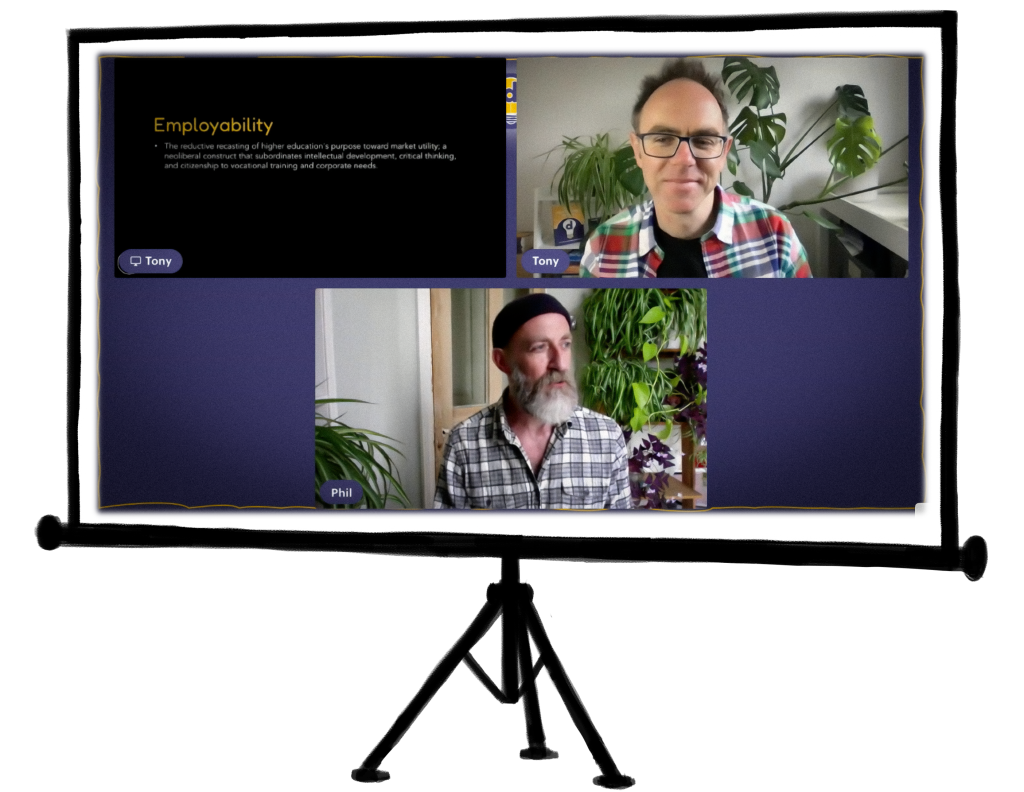
|
|
|
|
|
|
|
|
|
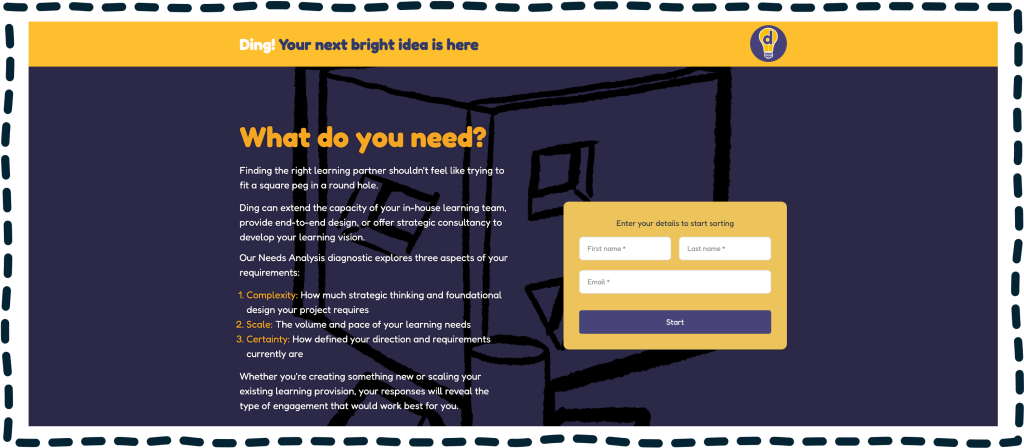
|
|
So, how do you prepare for a shiny new future where knowledge itself is transforming? Where the skills of tomorrow look nothing like the training of today?
|
We appreciate that 'brave new worlds' can feel overwhelming—whether you're worried about staying relevant, scaling your learning provisions, or simply finding your bearings. Sometimes you need a total reimagining—a completely new enterprise that transforms how your organisation approaches learning and development. Perhaps you need a precision tune-up—scaling and optimising your existing learning provisions to make them more effective and aligned with your strategic goals. Or maybe you just need a trusted advisor—someone to help you see your learning challenges from a new perspective, or clarify a future direction that's always been just out of focus.
|
Why not complete our 5-minute diagnostic to uncover tailored insights about your learning development needs. It's simple, it's quick and it's not rocket-science. Based on your answers you'll get some useful insights. Then, you can arrange a no-obligation consultation with Tony and Phil to explore your specific challenges
|
|
But if you'd rather have a chat right away, you can book a no-strings discovery session with the Ding team. We'll listen, explore, and help you 'boldly go'—no sales talk, just genuine conversation.
|
|
|
|
|
|
|
|
|
|
|
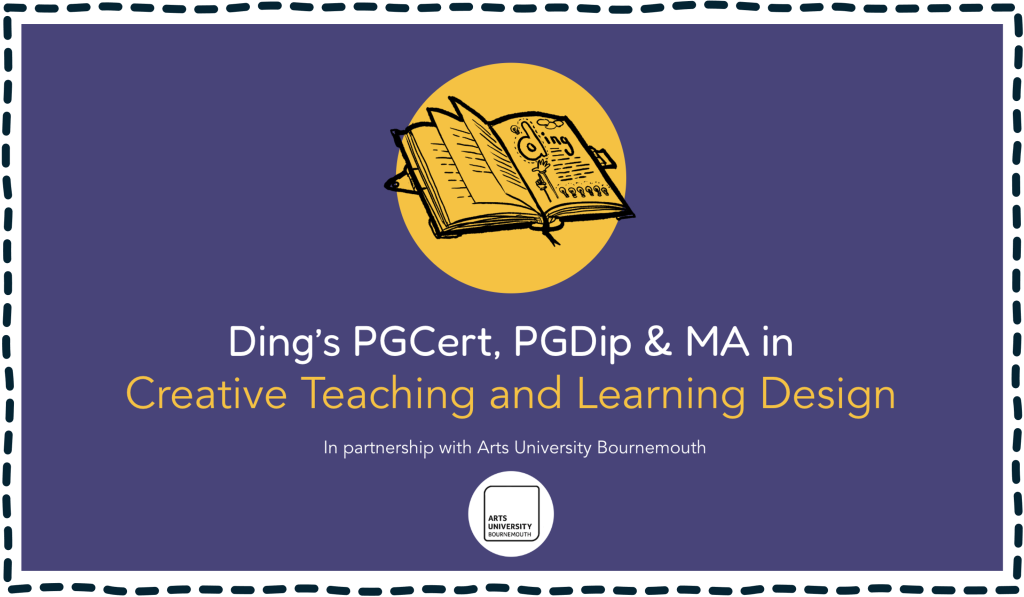
|
|
And if it's bold conversations about the future of learning you're seeking out, our MA in Creative Teaching and Learning Design offers the perfect forum for deeper exploration and development. This programme represents a natural progression for educators and learning professionals who want to shape rather than simply respond to the changing educational landscape.
|
The qualification is thoughtfully structured in three progressive stages:
|
- Postgraduate Certificate (PGCert) forms the foundation, exploring the six core pillars that support effective learning: empathy, curriculum, inclusivity, facilitation, technology and community. This stage strengthens your ability to design learning experiences while reflecting critically on the relationship between teaching, learning design, assessment and feedback.
- Postgraduate Diploma (PGDip) builds your practical toolkit as a learning designer. You'll develop professional skills in working with subject matter experts, project management, digital technologies, and contextualising your approach through small-scale research that directly relates to your practice.
- Master of Arts (MA) culminates in a substantial research project that allows you to investigate in depth how creative teaching and learning design can address complex educational challenges. This final stage enables you to contribute meaningfully to the discipline while developing solutions relevant to your specific context.
Designed for part-time study to enable professional application, the programme encourages you to speculate on alternative educational futures while developing practical capabilities that can be immediately applied.
|
|
Rather than simply adapting to change, graduates are equipped to imagine and create new possibilities for learning experiences that transcend traditional boundaries.
|
|
|
|
|
|
|
|
|
|

|
|
But why wait to begin your exploration of learning design? Here's your launch pad to help you start your journey right away:
|
|

|
|
|
|
|
|
|
|